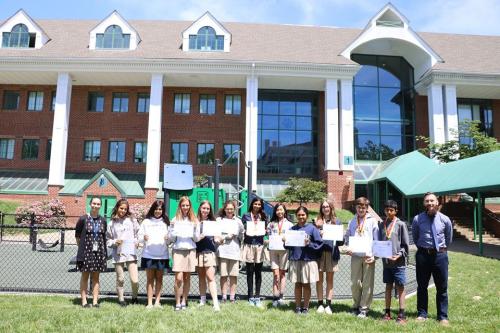[Connected student interview] interview with a student in a cheerleading squad in US high school
Interview with Se Jin Park, a 10th-grade student in a private school in NJ
Se Jin Park is studying in a private school in NJ since the 3rd year in middle school. We have asked her about how to make friends at the beginning of studying abroad and what she has learned in a cheerleading squad which many female students want to be part of. Let’s find out the secret how Se Jin is enjoying satisfying study abroad.

Q. Hello, tell us about yourself.
Hi, I am Se Jin Par, and I am from Busan and now studying in NJ. I spent a month in Virginia when I was in the 5th grade in an elementary school for language training, and studied for 10 months in a public school in Michigan after applying for an exchange student program which is sponsored by US State Department when I finished the 1st semester in the 3rd year in middle school. This is the first year in New Jersey which required some time to be acclimated. But I settled without problem and am able to finish the school.
Q. What made you study abroad?
Since I was an elementary school student, I was very much interested in international organizations, cultures and languages of other countries, and I really wanted to try living abroad. Because the host family I met in Virginia gave me a good impression of US, I have slowly cultivated my dream of studying in US. My parents have always supported my dream, and when I reached the age to apply for the US State Department’s Exchange Student Program, I just wanted to study abroad for 10 months. During that time, I had a good experience, met wonderful friends, and was able to continue my studying abroad thanks to support from my host family.
Q. How is the private school you go to now different from a public school?
The basic difference between private and public schools is the school uniforms, number of students per class, and school-designated religion. But, the biggest difference I have felt is the interests of teachers and parents towards education. You may have different opinion depending on which private school you go to, but the private school in New Jersey has fewer than 25 students per class. I liked the fact that teachers can focus on all students, help them study individually, and students can maintain close relationship with faculty. These are hard to find when I participated in an exchange student program in a public school.
Q. How much do you like your life abroad?
I am very happy with it now. I can’t say it is perfect. But I learned how to be thankful with helps from many people. And when I face a difficult situation, I think that developing a mindset to overcome such difficulty is an important part of my study abroad life.

Q. Was it hard to make friends?
I like to talking to people, so it wasn't hard for me to make friends. But, when I first got to know my friends, I had to put in a lot of effort to break the ice. Public schools have a relatively large number of students, so making friends was easy. But, due to the nature of private schools, there are students who went to schools together since kindergarten, so it was a little difficult to make new friends in a family-like environment which was already formed. For me, the fast way to know my friends was by first engaging in conversation with them friendly and getting to know more students by joining the school sports teams. In Michigan, I was in a cross-country team, and in New Jersey, I am on the cheerleading squad.
Q. How did you make it to the cheerleading squad?
At first, I was thinking of doing different sports. But coincidentally, my host parent was the cheerleading coach at my school and I had a chance to learn the moves. After the first practice, I was able to participate in the cheerleading squad by passing the ‘cheer tryout’ like any other students. ‘Tryout’ is a stage where you are judged before joining the team. The most important thing is to show your motivation to become a cheerleader. International students like myself may miss the “tryout” of the sports when they first go to school. In that case, they should try out after explaining the situation to the coach of the sports you want to join.

Q. What do you do in a cheerleading squad? How much do you like it?
Mainly, cheerleading squad cheers for the school at the main sporting events. A main sport of my school is basketball, so I go to the basketball game and cheer for the school. Usually, we recite the cheer routine and phrases we learned during the practice, and cheer for the school. After each period, we cheer in the basketball court, and cheer and dance for about 3 minutes during the half time. I am very happy with it because I am able to make friends and exercise as I participate in cheerleading. In addition, cheerleading squad is only active during the season, so I have time to rest during the offseason.
Q. Tell us about the difference between Korean and US education.
The difference I felt is that the two countries have difference value in curriculum. In Korean education system it is helpful to get in a college if you have good grades and lots of in-school awards for study are recorded in the daily student records. But in US education system, to get in a college, it is important that getting good grades and participating in other club activities or sports teams. Also, I don't feel that school life in US is as difficult as school life in Korea. For homework and exams, I think that questions requiring thoughts are more important than questions with fixed answers.
Q. Tell us about your plan and desired major.
I’m in my junior year, and I am planning to prepare for the SAT and for college admission soon. I haven't yet decided on the school I want to go to, but I hope to major in psychology and counseling. Many plans have been canceled this year due to coronavirus. But in the future, I want to have more specific plans for the future by volunteering and participating in many other activities.


![[영어캠프후기] 영어 캠프 참가 아이들의 생생한 캠프 이야기 (캠프 후기)](https://connectedu.com/uploads/20250416/zDmO0ObMIjadZUY.png)






